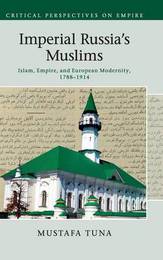
|
Imperial Russia's Muslims: Islam, Empire and European Modernity, 1788-1914
Hardback
Main Details
| Title |
Imperial Russia's Muslims: Islam, Empire and European Modernity, 1788-1914
|
| Authors and Contributors |
By (author) Mustafa Tuna
|
| Series | Critical Perspectives on Empire |
|---|
| Physical Properties |
| Format:Hardback | | Pages:292 | | Dimensions(mm): Height 231,Width 152 |
|
| ISBN/Barcode |
9781107032491
|
| Classifications | Dewey:947.0088297 |
|---|
| Audience | | Professional & Vocational | |
|---|
| Illustrations |
11 Halftones, black and white
|
|
Publishing Details |
| Publisher |
Cambridge University Press
|
| Imprint |
Cambridge University Press
|
| Publication Date |
4 June 2015 |
| Publication Country |
United Kingdom
|
Description
Imperial Russia's Muslims offers an exploration of social and cultural change among the Muslim communities of Central Eurasia from the late eighteenth century through to the outbreak of the First World War. Drawing from a wealth of Russian and Turkic sources, Mustafa Tuna surveys the roles of Islam, social networks, state interventions, infrastructural changes and the globalization of European modernity in transforming imperial Russia's oldest Muslim community: the Volga-Ural Muslims. Shifting between local, imperial and transregional frameworks, Tuna reveals how the Russian state sought to manage Muslim communities, the ways in which both the state and Muslim society were transformed by European modernity, and the extent to which the long nineteenth century either fused Russia's Muslims and the tsarist state or drew them apart. The book raises questions about imperial governance, diversity, minorities, and Islamic reform, and in doing so proposes a new theoretical model for the study of imperial situations.
Author Biography
Mustafa Tuna received his Ph.D. from the History Department of Princeton University, New Jersey in 2009 and is currently the Andrew W. Mellon Assistant Professor of Slavic and Eurasian Studies at Duke University, North Carolina, with a secondary appointment in History. His research focuses on social and cultural change among the Muslim communities of Central Eurasia, especially the Volga-Urals region and modern Turkey, since the early nineteenth century. He is particularly interested in identifying the often intertwined roles of Islam, social networks, state or elite interventions, infrastructural changes, and the globalization of European modernity in transforming Muslim communities. His research and analysis crosses the boundaries between Eurasian and Middle Eastern studies. He has received numerous research awards and scholarships including a Fulbright Scholarship, which allowed him to continue his graduate studies in America following a B.A. in International Relations at Bilkent University, Ankara, a Princeton University Center for the Study of Religion Award, a Princeton University Russian Studies Fellowship, and a Eurasia Program of the Social Science Research Council Award.
Reviews'In Imperial Russia's Muslims: Islam, Empire, and European Modernity, 1788-1914, Mustafa Tuna provides us with a thorough discussion of the worlds of Muslims in central Russia, from the establishment of the first Imperial Muftiate by Catherine the Great in 1788 to roughly World War I. This well-written monograph is an attempt to rethink the complex situation of Muslims in a non-Muslim empire by introducing the concept of domains ...' Vladimir Bobrovnikov, The American Historical Review 'Tuna's book is a thought-provoking work and a valuable contribution to a vibrant field of studies of Russian Muslim societies, as well as a part of a growing appreciation for cross-regional phenomena in the study of empire.' Elena I. Campbell, Slavic Review 'This well-written monograph provides us with a thorough discussion of the worlds of Muslims in Central Russia, from the establishment of the Imperial Muftiate by Catherine the Great in 1788 to roughly the First World War. Tuna's book is an attempt at rethinking the complex situation of Muslims in a non-Muslim empire by introducing the concept of domains.' Michael Kemper, Die Welt des Islams
|